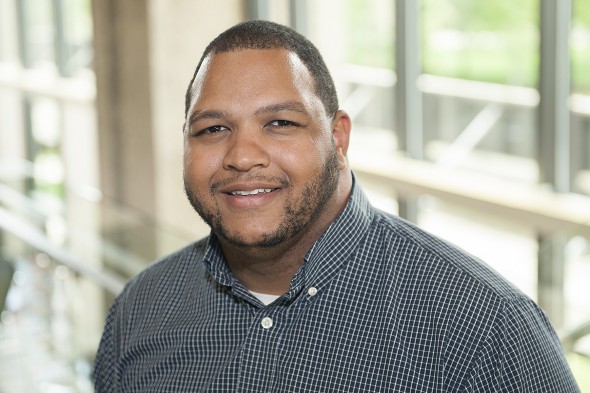Looking at urban issues through the lens of economics

Marcus Casey studies neighborhood sorting, “people moving places based on their preferences.” Photo: Roberta Dupuis-Devlin/UIC Photo Services
What if there is a murder in the neighborhood while school kids are getting tested? Will it depress test scores?
It looks that way to Marcus Casey, who examines such questions in his work on urban issues, crime, labor and education.
Violence at test time could also unfairly affect the assessment of teachers, said Casey, assistant professor of economics. In determining “value added” in respect to teacher performance, ordinarily the students’ testing performance is a fair reflection of how well a teacher is doing his or her job.
“But in an environment not related to what the teacher did — say, a shooting — it makes it seem like the teacher doesn’t have as much value added as they did,” Casey said.
“I’m also working on violence and neighborhood sorting — people moving places based on their preferences,” he said. Sorting, leading to such results as primarily black neighborhoods on the South Side, may derive from racial discrimination.
But that isn’t the only reason. “Say I’m middle class — I may have no racial prejudice, but I prefer to live with people like myself,” Casey said.
If African Americans find themselves living in an area where many shootings occur, “is it that blacks don’t care as much about violence?” Casey asked. “No, they care as much as anyone. But they want to live with people who look like them.” The type of goods and services available — black-oriented restaurants or nightspots, for example — may persuade African Americans to live in an all-black neighborhood even if they don’t have to.
In his research on charter schools, which operate with fewer bureaucratic limits than ordinary public schools, Casey is mindful that supporters of traditional public schools in Chicago consider them a threat.
“We try to argue that you need to take a long-term view,” he said. “In Texas, even the worst charters are rapidly improving compared with regular public schools. They can be a mechanism for choice, a laboratory for things that can spread into [other] public schools.”
Vouchers, which provide households with money for private or parochial schools, “and charters are two sides of the same coin,” Casey said. “They generate competition.”
His work is based on numbers from the Texas public schools. “They’ve been collecting data since the ’90s,” he said. “It’s the most comprehensive data set out there.” Steven Rivkin, his UIC colleague and co-author of a study he’s working on, is on the executive committee of the Texas Schools Project.
Casey has also examined racial and ethnic price differentials in the housing market. He and co-authors have seen higher prices charged to blacks and Hispanics due to landlords who engage in steering, contrary to previous findings that used a different research design. Black women pay a premium compared with black men or couples, he’s found. “It’s unclear why.”
One thing Casey likes about his work is that “it combines broad social interests with quantitative tools, statistical and mathematical,” he said. “It brings some structure to our reasoning about social issues and disciplines our thinking about them.”
Casey grew up on the South Side and in south suburbs and Fort Worth, Texas. He earned a bachelor’s degree magna cum laude from Howard University, and a master’s and Ph.D. from UIUC. He did two years of postdoctoral work at Duke University. He lives in River West with his wife, Marie-Lyne, who works for an insurance company, and their two daughters, Lauryn, 6, and Jessica, 3.
How did he and his wife meet?
“We’re that rare example of a couple that was set up by a mutual friend for a blind date and actually hit it off,” Casey said.
